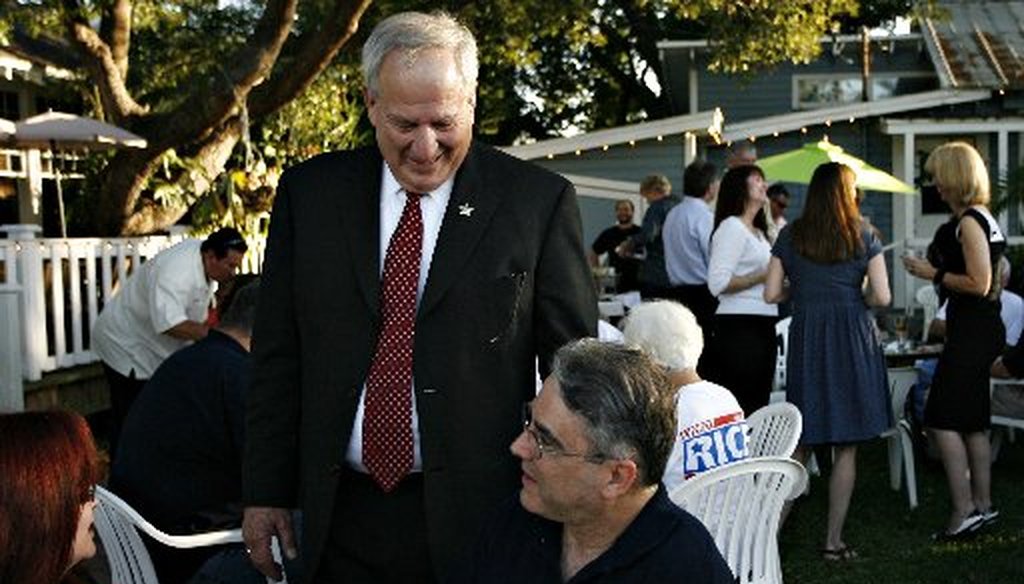Stand up for the facts!
Our only agenda is to publish the truth so you can be an informed participant in democracy.
We need your help.
I would like to contribute

Everett Rice is fighting against an attack that he'd be a double dipper if he's elected Pinellas County sheriff. (Times photo, Melissa Lyttle)
Everett Rice wants to be Pinellas County sheriff again, but he doesn’t want another title that would come with victory.
He doesn’t want to be known as a "double dipper," the term coined for public workers who retire only to return to the field, simultaneously drawing a taxpayer-paid pension and salary.
If elected, Rice, who spent two years in the Florida House after four terms as sheriff, would collect a $158,000 annual salary and a $107,000 annual state pension, plus health benefits.
Rice pledged to donate his pension to Florida Sheriffs Youth Ranches, a nonprofit network housing at-risk children, thereby "eliminating the double-dipping controversy."
"When some people hear that a public servant is going to be collecting a pension and a salary, it's striking a chord with them. It makes them mad," he told the Tampa Bay Times in a June 7, 2012, story. "And I don't like being called a double dipper."
Those comments are a departure from interviews in which he defended the scenario, saying he earned the pension over a 34-year career. But his change of heart elicited cheers at a news conference and online. One Tampabay.com commenter wrote, "Everett: Good move. In all honesty this is the only thing that I have trouble with. The double dipping needs to stop!"
We decided to not put Rice's statements to the Truth-O-Meter, in part because they were artfully worded. But we did think a fuller examination was warranted.
Rice’s decision to donate his state pension is generous -- and politically expedient. But technically, it doesn’t really change his status as a double dipper. Taxpayers would continue to pay for his pension and salary. Rice, now an attorney, would just be changing where pension goes, not to mention reaping a tax deduction for the donation.
A better solution, says Sen. Mike Fasano, R-New Port Richey, a longtime critic of double dippers, would be to copy Gov. Rick Scott and reduce his annual salary to $0.12.
Rice balked at that during the news conference, saying, "For Fasano to say that by me not keeping my pension doesn’t save the taxpayers money, that’s just wrong. The Florida Sheriffs Youth Ranches has the best track record of helping our neglected and unwanted children."
Fasano isn’t wrong, for reasons we’ve already explained.
Either way, there’s no chance Rice would return his pension to the state or salary back to the county, he told PolitiFact Florida. That would be like throwing money at a "black hole somewhere and doesn’t do anybody any good."
"If accepting my pension payments and turning them over to the Florida Sheriffs Youth Ranches still makes me a double dipper, then I’ll accept it," he said. "I would challenge anyone else that’s a double dipper to do the same thing."
The 11-year-old loophole that allows for double dipping was detailed by the Times in several stories starting in 2008. Senior correspondent Lucy Morgan found lawmakers quietly amended a retirement bill in 2001 to allow elected officials to receive retirement benefits as well as regular pay.
Lawmakers have said that wasn’t their intent, but thousands of elected officials have used the loophole to their advantage. In some cases, payments come on top of a lump-sum payment from the Deferred Retirement Option Program, created in 1998 to encourage the retirement of high-ranking employees.
Such is the case with Rice, who received a DROP payout of $344,860 in November 2004.
Employees are eligible for DROP when they reach retirement age or 30 years of employment and agree to retire within five years. Monthly retirement benefits remain in the pension fund and earn interest until they leave the job.
Rice’s Republican opponent, Sheriff Bob Gualtieri, called the donation plan "an empty afterthought" and chided Rice for keeping the cash payout. Rice defended himself to a Times reporter, saying, "That money that was part of the DROP program was tantamount to a 401(k), and my money went into it."
Actually, Rice did not contribute to DROP in the way private sector employees contribute to a 401(k), though lawmakers in 2011 reduced public employees’ pay 3 percent as a "pension contribution" -- a matter currently tied up in court. What Rice means, he says, is the money that went into DROP was retirement pay to which he was entitled.
Rice points out he wouldn’t be the first Pinellas sheriff to be a double dipper. Sheriff Jim Coats, who resigned this year, also collected a salary, retirement pay and a DROP payout from decades spent at the agency.
"I don’t understand why Gualtieri has an issue with double dipping when his own boss did it for many years," Rice said.
University of South Florida tax professor Ryan Huston suggested Rice could save about $30,000 by writing off his hypothetical donation, though it’s really a fluid "guesstimate" that doesn’t account for a lot of other variables.
"I would never tell you to just give away money for tax benefits," Huston said.
Rice's decision may win over voters, but he would still be drawing two sizeable checks from the state. That means he'll remain a double dipper.
Times staff writer Peter Jamison contributed to this report.
Our Sources
DROP FAQ, Florida Department of Management Services
YouTube.com, Fox 13 investigation of Everett Rice’s potential double-dipping,May 30, 2012
Interview with Ryan Huston, University of South Florida tax professor, June 6, 2012
Interview with Sen. Mike Fasano, R-New Port Richey, June 7, 2012
Tampa Bay Times, "Rice says he'll cure 'double dipping' by donating sheriff's pension to charity," June 7, 2012
Interview with Kris Purcell, Department of Management Services spokesman, June 6, 2012
Interview with John Kuczwanski, State Board of Administration spokesman, June 6, 2012
Channel 10 News, "Everett Rice promises to donate his pension to charity if elected Pinellas County Sheriff," June 5, 2012
Tampa Bay Times, "State retiree loophole costs Florida $300M a year," Feb. 23, 2012
Interview with Everett Rice, June 8, 2012










































